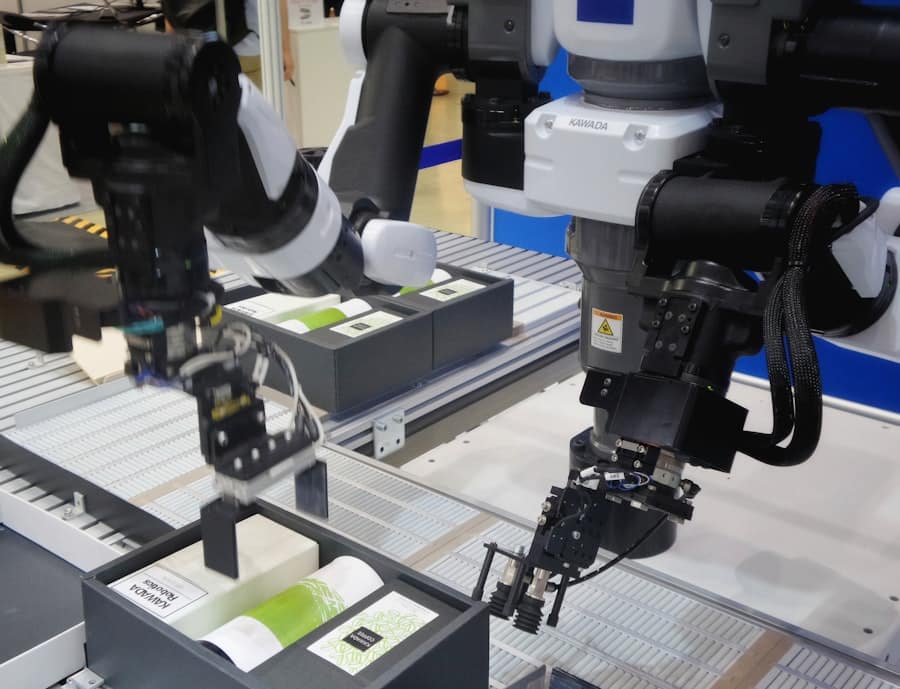In the rapidly evolving landscape of manufacturing, the advent of smart automation platforms has revolutionized traditional production methodologies. These platforms leverage advanced technologies such as artificial intelligence (AI), machine learning, and the Internet of Things (IoT) to create interconnected systems that enhance operational efficiency and flexibility. Smart automation platforms are designed to optimize processes, reduce human error, and facilitate real-time data analysis, enabling manufacturers to respond swiftly to market demands and operational challenges.
As industries face increasing pressure to innovate and adapt, the integration of these platforms has become a pivotal strategy for maintaining competitiveness. The significance of smart automation platforms extends beyond mere efficiency gains; they embody a paradigm shift in how manufacturing entities approach production. By harnessing data-driven insights, manufacturers can make informed decisions that align with their strategic goals.
This transformation is not just about automating repetitive tasks; it encompasses a holistic approach to manufacturing that integrates various functions, from supply chain management to quality control. As businesses strive for agility in their operations, understanding the role of smart automation platforms becomes essential for navigating the complexities of modern manufacturing environments.
Key Takeaways
- Smart automation platforms are revolutionizing the manufacturing industry by integrating advanced technologies like AI, IoT, and robotics to streamline processes and improve efficiency.
- Agile manufacturing offers benefits such as increased flexibility, faster time to market, and better response to customer demands, making it essential for staying competitive in today’s market.
- Smart automation platforms play a crucial role in agile manufacturing by enabling real-time data analysis, predictive maintenance, and adaptive production processes.
- Integration of smart automation platforms with manufacturing processes allows for seamless communication between machines, improved decision-making, and reduced downtime.
- Case studies demonstrate successful implementation of agile manufacturing with smart automation platforms, resulting in cost savings, improved quality, and enhanced customer satisfaction.
Benefits of Agile Manufacturing
Agile manufacturing is characterized by its ability to adapt quickly to changing market conditions and customer demands. One of the primary benefits of this approach is enhanced responsiveness. In an era where consumer preferences can shift overnight, agile manufacturing allows companies to pivot their production strategies without significant downtime or resource wastage.
This flexibility is crucial for businesses aiming to maintain relevance in competitive markets, as it enables them to introduce new products or modify existing ones in response to real-time feedback. Another significant advantage of agile manufacturing is the reduction of lead times. Traditional manufacturing processes often involve lengthy production cycles that can hinder a company’s ability to meet customer expectations.
Agile methodologies streamline these processes by promoting cross-functional collaboration and iterative development. For instance, manufacturers can employ techniques such as just-in-time (JIT) production, which minimizes inventory costs while ensuring that products are available when needed. This not only enhances customer satisfaction but also contributes to overall cost savings, making agile manufacturing an attractive option for businesses seeking to optimize their operations.
Role of Smart Automation Platforms in Agile Manufacturing

Smart automation platforms play a critical role in facilitating agile manufacturing by providing the tools necessary for real-time data collection and analysis. These platforms enable manufacturers to monitor production processes continuously, allowing for immediate adjustments based on performance metrics. For example, if a particular machine is operating below its optimal capacity, the system can automatically alert operators and suggest corrective actions.
This level of responsiveness is essential for maintaining productivity and ensuring that production schedules are met. Moreover, smart automation platforms enhance collaboration across different departments within a manufacturing organization. By integrating various functions—such as design, engineering, and supply chain management—these platforms create a unified ecosystem where information flows seamlessly.
The result is a more cohesive approach to manufacturing that aligns with the principles of agility, enabling organizations to respond effectively to both internal and external challenges.
Integration of Smart Automation Platforms with Manufacturing Processes
The integration of smart automation platforms into existing manufacturing processes requires careful planning and execution. Manufacturers must assess their current workflows and identify areas where automation can add value. This often involves mapping out processes to pinpoint bottlenecks or inefficiencies that could be alleviated through automation.
For instance, a manufacturer may discover that manual data entry is causing delays in production reporting; implementing an automated data capture system could streamline this process significantly. Once potential areas for integration have been identified, manufacturers must select the appropriate smart automation technologies that align with their operational goals. This could involve deploying robotics for assembly tasks, utilizing AI-driven analytics for predictive maintenance, or implementing IoT sensors for real-time monitoring of equipment performance.
The key is to ensure that these technologies are compatible with existing systems and can be scaled as needed. A phased approach to integration can help mitigate risks and allow for adjustments based on initial outcomes.
Case Studies of Successful Agile Manufacturing with Smart Automation Platforms
Several companies have successfully implemented smart automation platforms within their agile manufacturing frameworks, showcasing the transformative potential of these technologies. One notable example is Siemens, which has integrated smart automation into its production facilities to enhance efficiency and flexibility. By utilizing IoT devices and AI algorithms, Siemens has been able to optimize its supply chain operations, reducing lead times and improving inventory management.
The company’s digital twin technology allows for real-time simulations of production processes, enabling rapid adjustments based on demand fluctuations. Another compelling case study is that of General Electric (GE), which has embraced smart automation in its aviation division. GE employs advanced analytics and machine learning algorithms to monitor engine performance data from its fleet in real time.
This proactive approach not only enhances maintenance schedules but also allows GE to offer predictive services to its customers, thereby increasing customer satisfaction and loyalty. The integration of smart automation platforms has enabled GE to maintain a competitive edge in a highly dynamic industry by fostering innovation and responsiveness.
Challenges and Solutions in Implementing Smart Automation Platforms for Agile Manufacturing

Addressing Employee Resistance to Change
Despite the numerous benefits associated with smart automation platforms, manufacturers often encounter challenges during implementation. One significant hurdle is the resistance to change among employees who may be apprehensive about adopting new technologies. To address this issue, organizations must invest in comprehensive training programs that equip employees with the skills needed to operate new systems effectively.
Integrating Disparate Systems
Another challenge lies in the integration of disparate systems within an organization. Many manufacturers operate legacy systems that may not be compatible with modern smart automation technologies. To overcome this obstacle, companies should consider adopting open architecture solutions that facilitate interoperability between different systems.
Collaborating with Technology Partners
Additionally, collaborating with technology partners who specialize in system integration can provide valuable expertise and resources to ensure a smooth transition. By working together, manufacturers can overcome the challenges associated with implementing smart automation platforms and reap the benefits of increased efficiency, productivity, and competitiveness.
Future Trends in Smart Automation Platforms for Agile Manufacturing
As technology continues to advance, several trends are emerging within the realm of smart automation platforms that will shape the future of agile manufacturing. One notable trend is the increasing use of artificial intelligence and machine learning algorithms to enhance decision-making processes. These technologies will enable manufacturers to analyze vast amounts of data more efficiently, leading to more accurate predictions regarding production needs and market trends.
Another trend is the growing emphasis on sustainability within manufacturing practices. Smart automation platforms are being designed with energy efficiency in mind, allowing manufacturers to monitor their energy consumption in real time and make adjustments accordingly. This focus on sustainability not only aligns with global environmental goals but also appeals to consumers who are increasingly prioritizing eco-friendly products.
Conclusion and Recommendations for Implementing Smart Automation Platforms in Manufacturing
To successfully implement smart automation platforms in manufacturing, organizations should adopt a strategic approach that encompasses thorough planning, employee engagement, and continuous evaluation of outcomes. It is essential for manufacturers to assess their unique needs and challenges before selecting appropriate technologies that align with their operational goals. By fostering a culture of innovation and collaboration, companies can maximize the benefits of smart automation while remaining agile in an ever-changing market landscape.
Furthermore, ongoing training and support for employees will be crucial in ensuring a smooth transition to automated processes. By investing in workforce development and encouraging open communication about technological changes, manufacturers can build a resilient organization capable of thriving in the face of future challenges. As smart automation continues to evolve, staying informed about emerging trends and best practices will empower manufacturers to leverage these technologies effectively and maintain their competitive edge in the industry.
If you are interested in learning more about the best software for furniture design, check out this article on Enicomp’s website. This article explores the various software options available for designing furniture and how they can enhance the manufacturing process. By incorporating smart automation platforms and innovative technology, manufacturers can streamline their operations and improve efficiency.
FAQs
What is smart automation in manufacturing?
Smart automation in manufacturing refers to the use of advanced technologies such as robotics, artificial intelligence, and Internet of Things (IoT) to automate and optimize manufacturing processes. This allows for greater efficiency, flexibility, and agility in production.
What are smart automation platforms?
Smart automation platforms are integrated systems that combine various technologies such as robotics, machine learning, and data analytics to enable automation and control of manufacturing processes. These platforms provide a centralized and interconnected system for managing and optimizing production operations.
How do smart automation platforms enable agile manufacturing?
Smart automation platforms enable agile manufacturing by providing real-time data and insights into production processes, allowing for quick decision-making and adaptation to changing demands. They also facilitate the integration of new technologies and the reconfiguration of production lines to accommodate different products and production requirements.
What are the benefits of using smart automation platforms in manufacturing?
Some of the benefits of using smart automation platforms in manufacturing include increased productivity, improved quality control, reduced downtime, and enhanced flexibility to respond to market changes. These platforms also enable predictive maintenance and resource optimization, leading to cost savings and improved overall efficiency.
What industries can benefit from smart automation platforms?
A wide range of industries can benefit from smart automation platforms, including automotive, electronics, pharmaceuticals, food and beverage, and consumer goods. Any industry that relies on manufacturing processes can leverage smart automation platforms to improve their production capabilities and responsiveness to market demands.

